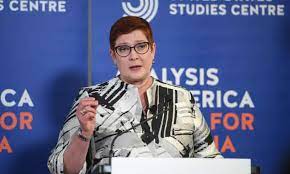Australian foreign affairs minister Marise Payne has denounced the “secret” terms of China’s security deal with Solomon Islands, while insisting “no document signed and kept away from public view” would change Australia’s commitment to answering Pacific countries’ needs.
The foreign affairs minister said the agreement was “not transparent” – unlike Australia’s existing security treaty with Solomon Islands – and was also being hidden from other Pacific countries.
As the Coalition continues to reject Labor’s claims it presided over the worst Australian foreign policy failure in the Pacific in decades, Payne said other members of the “Pacific family” shared Australia’s concerns about the secretive arrangement.
The prime minister, Scott Morrison, has relied on the public promises of his counterpart, Manasseh Sogavare, that Solomon Islands would not allow a Chinese military base or a persistent military presence.
But Payne revealed on Thursday Australia had “continued to seek assurances on that and we will be doing so into the future”.
Payne made the remarks during a significant pre-election foreign policy address, during which she warned “we’ve entered a period that is becoming more dangerous, less stable and less prosperous”.
She called for “rules over anarchy” and argued the Coalition’s hard line against Beijing’s “growing assertiveness” had been vindicated.
“We have led on this,” Payne said at a United States Studies Centre event in Sydney.
“There is now strong agreement from amongst the Australian people that standing firm on our values and principles, even in the face of pressure, is the right approach for our long-term future.”
In a reference to China, Payne said “a region in which an authoritarian power is dominant doesn’t get us closer” to Australia’s goal of a freer, more open Indo-Pacific.
But China’s signing of the security agreement with Solomon Islands, 1,600km from Cairns, has complicated the Coalition’s push to project a strong message on national security before the 21 May election.
On Thursday a key adviser to the premier of the most populous province in Solomon Islands also expressed concern that the deal could enable Sogavare to use Chinese armed police and military personnel to quash democratic dissent and hold power for years to come.
Payne implicitly rejected claims Australia had “dropped the ball” in the region.
Australia had been dealing with security developments “consistently for some time”, including discussions about China’s desire to establish a security presence in the region, she said.
Those conversations had enabled Australia to “even more readily” deploy Australian federal police and Australian defence force personnel in response to unrest in Honiara in November and December, together with New Zealand, Papua New Guinea and Fiji.
“It’s important to acknowledge that that is a Pacific family security response that worked, that was immediate, that addressed the needs of the Solomon Islands,” Payne said.
But she said “ultimately a security arrangement kept secret at the insistence of a partner is what we are dealing with now”.
Payne acknowledged that Solomon Islands had made a sovereign decision but added: “We know other members of the Pacific family share our concerns.”
When asked late on Wednesday whether Beijing planned to disclose the whole treaty, a Chinese foreign ministry official said the two countries would “act in accordance with international customary practice on the basis of bilateral consultation”.
The official, Wang Wenbin, said “some Australian politicians” were “seeking their own political gains by making denigrating remarks against China”. He accused the U.S and Australia of “pure double standards”.
“The U.S shows no openness and transparency when it conducted nuclear tests and dumped nuclear wastes in the South Pacific region and when Aukus opened the Pandora’s box of nuclear proliferation in the Asia Pacific region,” Wang said.
Labor’s home affairs spokesperson, Kristina Keneally, echoed Payne’s concerns about the secrecy surrounding the deal.
“We have already now got China dictating terms to a member of our Pacific family,” Keneally told reporters in Sydney.
But Donald Rothwell, a professor of international law at the Australian National University, said reports that China had advised Solomon Islands it did not wish the treaty to be publicly released at this time were “not exceptional”.
Rothwell said there was no requirement under international treaty law that a treaty be immediately made publicly available.
“Some care needs to be taken to applying Australian standards to this treaty, especially when it is asserted it is ‘secret’,” he said.
“Australian treaty practice in this regard is generally considered to be world leading, but I would observe that in my experience there is always a time lag between an announcement that a treaty has been signed and when it becomes publicly available.”
Keneally continued to prosecute the argument Morrison “has been caught asleep at the wheel and as a result Australia is less secure”.
She cited “extraordinary” remarks from the head of Australia’s Office of National Intelligence, Andrew Shearer, denying that the deal reflected an intelligence failure.
“That means it was a government failure,” Keneally said.
Keneally accused Karen Andrews of indulging in “conspiratorial fantasies and unhinged commentary about foreign interference” after the home affairs minister implied on Wednesday China might have timed the announcement to influence the Australian election outcome.
Keneally said Andrews had yet to reply after she wrote to the minister on Wednesday reminding her of “the vital convention that opposition is briefed on any developing matters of national security” during the election campaign.
Andrews has not responded to Guardian Australia’s questions about the matter.
SOURCE: THE GUARDIAN/PACNEWS













